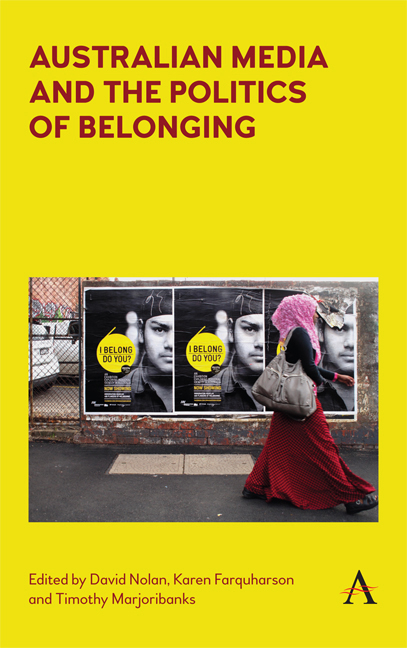Book contents
- Frontmatter
- Contents
- List of Illustrations
- Acknowledgements
- Part I THEORIZING BELONGING IN CONTEMPORARY AUSTRALIA
- Chapter 1 Australian Media and the Politics of Belonging
- Chapter 2 Politics of Belonging in a Mediated Society: A Contribution to the Conceptual Exegesis
- Chapter 3 Media, Belonging and Being Heard: Community Media and the Politics of Listening
- Part II SUDANESE AUSTRALIANS, MEDIA PRACTICES AND THE POLITICS OF BELONGING
- Part III SHIFTING THE POLITICS OF BELONGING: MEDIA INTERVENTIONS AND POSSIBILITIES FOR TRANSFORMATION
- Notes on Contributors
- Index
Chapter 2 - Politics of Belonging in a Mediated Society: A Contribution to the Conceptual Exegesis
from Part I - THEORIZING BELONGING IN CONTEMPORARY AUSTRALIA
Published online by Cambridge University Press: 21 June 2018
- Frontmatter
- Contents
- List of Illustrations
- Acknowledgements
- Part I THEORIZING BELONGING IN CONTEMPORARY AUSTRALIA
- Chapter 1 Australian Media and the Politics of Belonging
- Chapter 2 Politics of Belonging in a Mediated Society: A Contribution to the Conceptual Exegesis
- Chapter 3 Media, Belonging and Being Heard: Community Media and the Politics of Listening
- Part II SUDANESE AUSTRALIANS, MEDIA PRACTICES AND THE POLITICS OF BELONGING
- Part III SHIFTING THE POLITICS OF BELONGING: MEDIA INTERVENTIONS AND POSSIBILITIES FOR TRANSFORMATION
- Notes on Contributors
- Index
Summary
Introduction
This chapter provides a conceptual introduction to the central theme of this volume – the way media, politics and belonging intersect in the ethnoculturally diverse Australia of the early twenty- first century. I undertake an intersectional analysis of four conceptual triads: ‘belonging- identity- community’; ‘media- communication- representation’; ‘Australia- politics- discourse’ and ‘reality- construction- perception’. In this section, the chapter first introduces key features of the Australian context in relation to the book's central interest.
Modern Australia is a ‘settler nation’ that developed through successive, progressively more diverse waves of immigration, dislodging and dispossessing the Indigenous population in the process. From the very start in the late eighteenth century, the colonizers were ethnically diverse, contravening the ideal of white Britishness (Moreton- Robinson 2006).
The 1901 federation of British colonies into the Commonwealth of Australia created the first new nation of the twentieth century. The considerable ethnocultural diversity of the nineteenth century was politically denounced and the ideal of a ‘white Australia’ pursued for the next 70 years (DIBP 2016). The enactment of the first major law of the Commonwealth parliament, the Immigration Restriction Act of December 1901, was primarily a reaction to the arrival of a significant number of Chinese during the Gold Rush. In the 1850s, the colonies of Victoria and South Australia introduced restrictions on Chinese immigration, prompted by the white miners’ resentment towards industrious Chinese on the goldfields (DIBP 2016). These restrictions were later repealed as the free movement of people was highly valued in the midnineteenth century (Bashford 2014), the period historian Eric Hobsbawm called the ‘age of capital’, ruled by what Germans called Manchesterismus – the ‘free trade orthodoxy of Victorian Britain’ (Hobsbawm 1996/ 1975: 303). However, the restrictions were reintroduced in all Australian colonies in the period 1870s – 1890s. The Commonwealth Immigration Restriction Act 1901 continued and reinforced this race policy where ‘prohibited immigrants’ were all ‘non- Europeans’. According to Bashford (2014, 31–32), these restrictions were part of ‘great white walls’ protecting the Anglosphere (Australia, United States, New Zealand) from ‘contamination’ by ‘coloured races’.
- Type
- Chapter
- Information
- Australian media and the politics of belonging , pp. 19 - 36Publisher: Anthem PressPrint publication year: 2018



